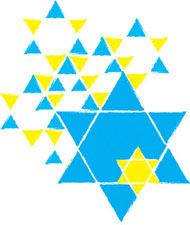P.O.V.: Where was God during the Holocaust?
P.O.V.: Where was God during the Holocaust? McGill University
User Tools (skip):
Where was God during the Holocaust?

Editor’s Note: Yom Hashoah, or the Holocaust Martyrs’ and Heroes’ Remembrance Day, was established in 1953 by an act of the Israeli Knesset to commemorate the six million Jews killed as part of Hitler’s Final Solution. This year, Yom Hashoah began on the evening of April 15 and continued through April 16.
In the 1950s, the Israeli parliament was correct to reject the suggestion put forth by the country’s Chief Rabbinate to mark the destruction of European Jewry through one of the existing Jewish days of mourning. The Holocaust (Shoah, in Hebrew) requires its own day of commemoration to allow us—Jews and non-Jews—to reflect on this enormous tragedy and dedicate ourselves to addressing its moral, political and religious lessons.
One of the most disturbing and universally significant of these lessons is that it is frighteningly simple to motivate large numbers of good people to commit appalling acts and that it is difficult to convince other nations—or even the fellow citizens of the targeted group—to intervene to prevent such acts. Accordingly, it is essential that every national and ethnic group possess the means to protect its members when necessary. The State of Israel was founded, in part, in response to this insight.
But power in itself does not bring peace and security. Ultimately, these depend on each of us developing that heroic level of empathy that allows us to truly love our neighbours as we love ourselves; that empathy that makes violence an impossibility and the denial of the legitimate rights and needs of others unthinkable.
Yom Hashoah is a day for mourning and remembering but it must ultimately motivate us to take constructive action in the present.
A number of high-profile books have been published recently that argue that religion is a negative force and that God is an illusion. I find both of these pronouncements simplistic.
The truth is that for every religious person who brings grief to the world, there is at least one whose acts of loving kindness are motivated and nourished by religious belief. The complexity and beauty of the natural world make it impossible for me to state categorically that there is no power that has set all of this in motion. But the horror of the Holocaust also makes it impossible for me to embrace the existence of a God of history—a God who causes the Red Sea to part or who initiates the processes that led to the fall of the Berlin Wall.
Such a God surely would have acted to stop the Holocaust early on—for example, by ensuring that one of the many attempts to assassinate Hitler succeeded. I know many Jews who believe that God acted “behind the scenes” to facilitate the Israeli military victories of 1948 and 1967. If God truly acts in this manner, why was there no life-saving intervention prior to 1945?
Although I can accept intellectually that God’s ways may be beyond my comprehension, I cannot forge a relationship to or worship a God who has the power to prevent Holocausts, famines, and wars but chooses not to use it.
The Holocaust museums that we have built honour the memory of the dead and remind us of the rich lives that they led, but they avoid asking the troubling theological questions. The Jewish community’s collective commemorations of Yom Hashoah are similarly silent.
Ultimately, however, the theological challenge must be faced.
Encountering the horrors of the Shoah on Yom Hashoah and throughout the year makes this inevitable.
Eric Caplan is an associate professor in the Department of Jewish Studies and director of the Jewish Teacher Training Program.

